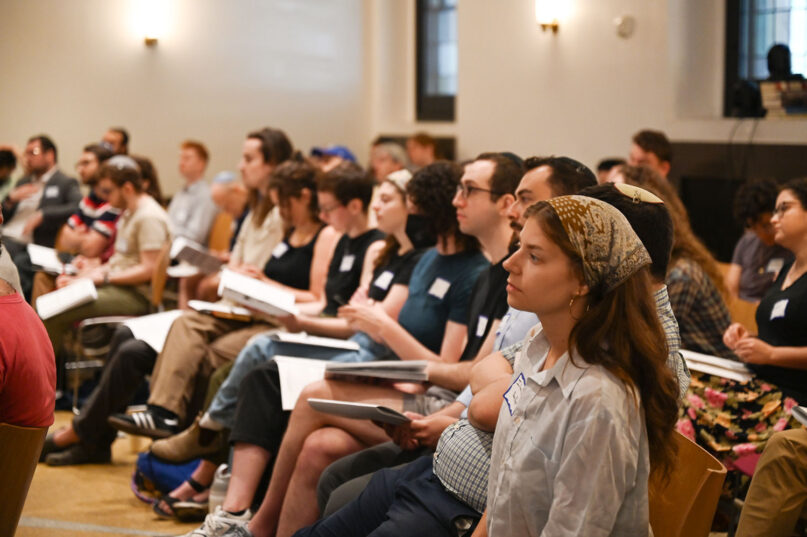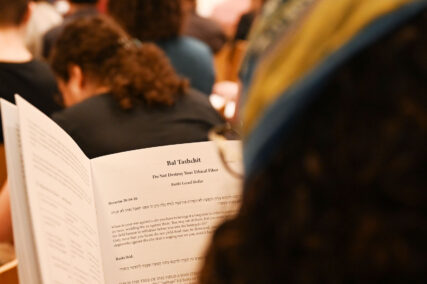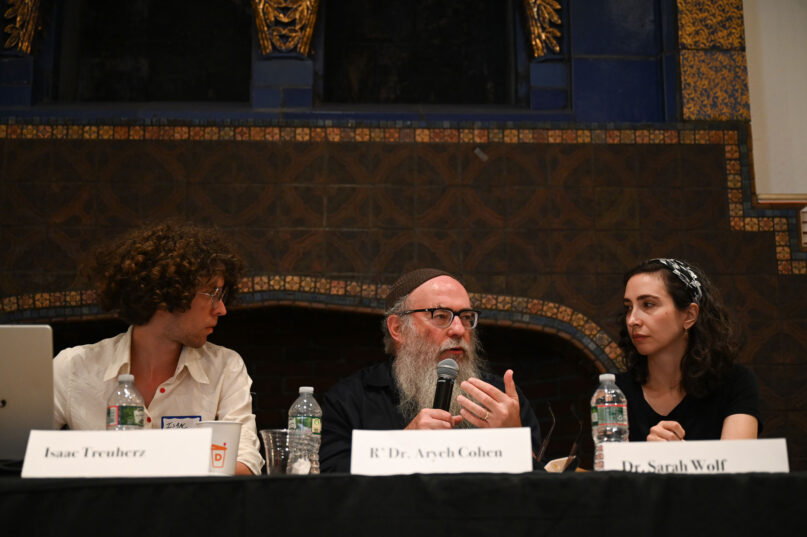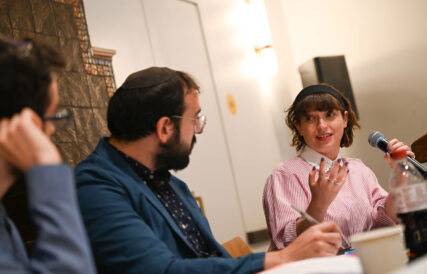NEW YORK (RNS) — In a conference room of an Upper West Side synagogue, a group of traditionally observant young Jews gathered last week to engage in an age-old form of rabbinic inquiry to address what they see as the moral crisis in Judaism today: the war in Gaza.
The daylong forum — the first of its kind for a nascent group called the Halachic Left — included a raft of scholars, teachers, rabbis and activists who read aloud commentaries, sometimes called “responsa,” they had written examining what Jewish texts say about war, nationalism, Jewish settlements and protest. About 140 people squeezed into a multipurpose room at the non-denominational B’nai Jeshurun Synagogue on July 20, with about 1,000 watching online, to listen to the discussions rooted in theological arguments from the Torah, the Talmud and the great Jewish sages.
For those in attendance, most in their 20s and 30s, it was a form of protest no less important than the campus encampments, the petitions, the hunger strikes and the calls for divestment from Israel that some left-leaning American Jews have engaged in since the Oct. 7, 2023, attack on Israel by Hamas and Israel’s brutal response in Gaza. Unlike some other groups critical of Israel that draw on a range of Jews and non-Jews, some observant, some not at all, Halachic Left participants grew up attending Modern Orthodox schools and synagogues. They continue to identify with the traditional obligations of Jewish life, though increasingly they pray in independent, egalitarian minyans, or prayer quorums, that allow greater equality for women and LGBTQ+ people.
Their challenge? How to find moral guidance for this time in the rules and practices that govern Jewish life, called halacha.

At a forum in an Upper West Side synagogue on Sunday, July 20, 2025, a group called the Halachic Left gathered to engage in an age-old form of rabbinic inquiry addressing what they see as the moral crisis in Judaism today: the war in Gaza. Photo by Gili Getz
“We are asking with the halacha’s voice how to protest the profound moral failings of our communities,” said Sofia Freudenstein, a recently ordained 27-year-old rabbi at the forum’s opening. “These pieces examine not only how halacha maps onto our current reality, but how it demands that we change it.”
The forum’s commentaries specifically explored issues like the ethical limitations of wartime siege, what Jewish ancient rabbis thought of boycotts, how medieval Jews used delaying services as a form of protest and what the Torah says about whether Jews are indigenous to the land of Israel, all through Jewish texts.
The gathering comes amid 21 months of war, during most of which Israel has pummeled the Gaza Strip. In recent weeks, starvation in Gaza has surged, and hunger-related deaths have spiked. Close to 60,000 Palestinians have been killed during the war, according to the Gaza Health Ministry.
RELATED: US cuts short Gaza ceasefire talks and accuses Hamas of lacking ‘good faith’
The Halachic Left is one of several new Jewish protest groups that have formed in the wake of Oct. 7 — when about 1,200 people in Israel were killed in the Hamas attacks, and about 250 were taken hostage in Gaza. The group’s emergence is striking because it stands in sharp contrast to the majority of Orthodox Jews in the U.S. who have grown increasingly right wing. A November 2024 poll of Jewish voters showed the Orthodox community overwhelmingly favored Donald Trump, with 74% voting for him, compared to the broader U.S. Jewish population, which still largely supports Democrats. And although some Haredi Jews are not Zionists, Modern Orthodox Jews, as a group, tend to be strongly supportive of Israel and staunch Zionists.

Attendees listened in on a conversation about Jewish ethics at a forum on Sunday, July 20, 2025 at an Upper West Side synagogue. Photo by Gili Getz
Yet, like the rest of American Jewry, there is a growing generational divide. When asked in a poll last year whether Israel was committing a genocide in Gaza, 38% of American Jewish adults under the age of 44 agreed, compared to 22% over the age of 44 who agreed.
The Halachic Left formed in January 2024 as a WhatsApp group chat that has now grown to some 700 participants. The group does not define itself as anti-Zionist, though some of its leaders use that term to describe themselves. On its website and in its literature, the Halachic Left says it opposes a regime of Jewish supremacy in all the lands Israel now controls.
As Caroline Morganti, one of the group’s three directors, shared at the end of the day, “With this conference we are beginning to build a space where we can advance a Torah that promotes rachmones (Yiddish for mercy and compassion) to all creation, including Palestinians, and more broadly can chart a way forward to engage in our tradition outside of an ethno-nationalist framework.”
The Halachic Left is not focused on forming synagogues or prayer spaces apart from other traditionally observant Jews, but seeks to influence Jewish thought and learning. With a small grant from the Open Society Foundations and funding from some individual donors, it plans to publish 10 of its commissioned papers in a book and online.
“The goal of the project,” said Noam Weinreich, another director, “is to have literature that we can reach for, to have sources that we can think through to better articulate our values in the language that we feel comfortable with.”

The Halachic Left forum included one panel discussion featuring Isaac Truehertz, left, Rabbi Aryeh Cohen and Sarah Wolf on Sunday, July 20, 2025 at an Upper West Side synagogue. Photo by Gili Getz
At the forum in New York, Jews wearing skullcaps and tzizit, or knotted ritual fringes on the side of their trousers, sat alongside others wearing T-shirts with LGBTQ+ equality slogans. Only a handful of Haredi Jews, or ex-Haredi Jews from the strictly Orthodox sects, attended.
The majority had extensive knowledge of Judaism and firsthand experience living in Israel. Lexie Botzum, a native of Allentown, Pennsylvania, spent five years in Israel, where she received her rabbinic ordination. Botzum wrote a commentary for the forum on whether kosher-keeping Jews could eat a vegetarian meal prepared by non-kosher-keeping Palestinians as part of their solidarity work.
While in Israel, she accompanied Palestinians in the West Bank as part of a “protective presence” project intended to deter settler violence and land grabs and document human rights violations.
Botzum said she grew “deeply disappointed” with the ways American and Israeli Jews have supplanted nationalism for Judaism.
“You can have absolutely no commitment to or knowledge of really anything about Jewish life and practice, but if you have an absolute fealty to Zionism, that is considered to be the ultimate expression of Jewish identity and commitment,” Botzum said. “I think that that is such a deeply sad state of affairs, not only because it leads to people supporting atrocities because they’re told that’s the only way of expressing their Jewishness; it’s an erasure of what actual Jewish life is.”
For the Halachic Left, reclaiming a diasporic Judaism outside of Israel — one that does not take a subordinate position to Israeli expressions of Judaism — is a top priority.
One of the papers commissioned by the group argues that diasporic Judaism should not try to strip traditional prayers and references to “Israel” and “Zion” from the liturgy, but argues for their original meanings when they were written thousands of years before the modern state of Israel.

Rabbi Avigayil Halpern, right, speaks during a forum hosted by Halachic Left on Sunday, July 20, 2025 . Photo by Gili Getz
“When we get rid of the word Israel in our davening (praying), we concede to the right and say, ‘Yes, Israel does mean the state of Israel,’ as opposed to saying, ‘That is never what these words meant,’” said Laynie Soloman, a teacher of Talmud and halacha at Svara, a queer yeshiva. “The state is not the culmination of our prayers.”
Rabbi William Friedman, who offered critiques to some of the commentaries at the forum, acknowledged the hard work ahead for members of the Halachic Left.
“It’s gonna be a long, slow process building legitimacy, pulling people into the project, giving halachic and other forms of argumentation that will draw people in,” Friedman said. “We are, I think, in an epic struggle to reclaim the Torah of chesed (loving-kindness), one which places Betzelem Elohim (the image of God) at the center and endeavors to fulfill God’s commandment to love both the insiders and outsiders.”
The work is overwhelming,” he concluded, “but we are not lazy.”
RELATED: Holding Israel accountable isn’t antisemitic — harming Jews is



